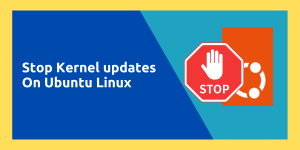A surprisingly small portion of the computer enthusiast market uses the Linux operating system. As such, it’s rarely targeted by ill-willed hackers or specialized malware. However, that doesn’t make its users immune to the slew of cyber threats lurking on the world wide web. At the very least, they still require extra precautions to enjoy online privacy.
Allow us to introduce the essential online tools Linux users should employ to fill their cybersecurity gaps. Naturally, they are free and open-source to accommodate the principles many Linux users uphold.
Why is online security important?
Linux has many selling points, one of which is the freedom and control you gain compared to Windows and macOS. And as mentioned previously, the OS is less likely to suffer from digital viruses because hackers don’t bother developing special software for a system that so few people use. Not to mention all the differences between Linux distributions.
However, the OS you use doesn’t reduce the dangers you can encounter online. For example, you can still suffer from virus-laden ads, privacy-diminishing trackers, mass data breaches, scams, phishing attempts, man-in-the-middle attacks, and countless other nuisances. Worst of all, these threats can severely impact your daily activities because our lives are intertwined with technology.
Thankfully, you only need a handful of tools and common sense to protect yourself against most online hazards. An excellent place to learn about both is the Cool Tech Zone website. It caters to technology fans, cybersecurity enthusiasts, and anyone interested in product reviews. But not onto the basics.
Top security tools for Linux
You don’t need a massive arsenal to cover the essentials regarding online security. Best of all, our recommended options are freemium, meaning you can use them without paying a dime. However, some of these products offer premium subscriptions, which grant bonus perks and guarantee the best possible results. Check them out and see whether they’re worth the investment.
VPN service
You’ll gain the most security bang for your buck with a high-quality VPN (Virtual Private Network) service. Firstly, it masks your whereabouts by redirecting your traffic through servers in another location of your choice. Furthermore, it encrypts your activities, making them impenetrable and unreadable to unwelcome third parties. Naturally, you can also receive other perks depending on your chosen provider.
The best VPN for Linux users is Proton VPN. Its freemium label makes the product ideal for frugal and well-off customers alike. You won’t have to worry about confidentiality because the service is located in privacy-respecting Switzerland. Meanwhile, top-notch connectivity is guaranteed with the cutting-edge WireGuard protocol.
Antivirus software
Malicious software can be hidden in any innocuous files and email attachments you receive. As such, it’s best to have an additional line of defense if you ever have a lapse of judgment and accidentally download a suspicious file.
ClamAV can perfectly fulfill this role on Linux systems. It’s free, open-source, and capable of protecting your machine against trojans, viruses, malware, and other dangerous threats.
Secure browser
The most surefire way to minimize exposure to online dangers is to use a secure gateway to the internet. I’m talking about the web browser because the most popular options aren’t necessarily the best. Instead, I recommend a less-known alternative called LibreWolf. It’s a customized version of Firefox that focuses on user privacy, security, and freedom from censorship.
Password manager
Data breaches happen almost daily, so one of your accounts will inevitably be compromised. However, this occurrence will be more devastating if you habitually reuse login credentials because one leak will lead to a cascade of breached accounts. As such, you must use a password manager to store your strong and unique login details. A solid option for Linux users in this regard is Bitwarden. It’s reliable and available on multiple platforms for easy log-ins on any device you own.
Conclusion
Although the Linux OS is less prone to malware attacks, no internet-connected device is ever completely secure. Therefore, taking extra precautions and installing safeguards against the most common attack vectors is paramount.
At the same, you should remember that these tools are merely an extension of good cybersecurity hygiene. So don’t forget to refresh your knowledge by visiting the Cool Tech Zone website.




